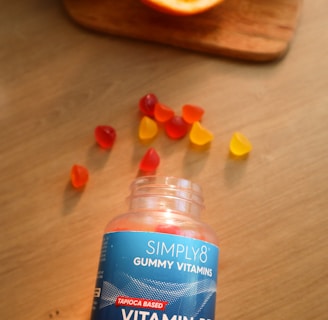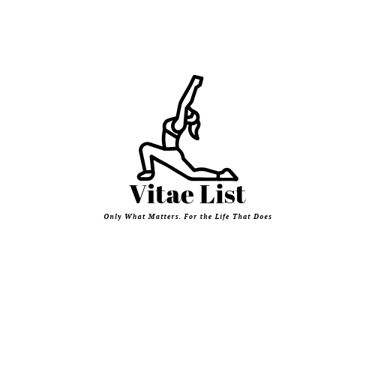Vitamins vs. Food: When Supplements Make Sense
Wondering if supplements are really necessary? Learn when it's better to rely on whole foods vs. when vitamins and minerals can fill nutrient gaps. We break down bioavailability, common deficiencies, and how to use supplements wisely.
NUTRITION
Vitae List
8/7/20253 min read


Vitamins vs. Food: When Supplements Make Sense
Understanding nutrient gaps, bioavailability, and when supplements can support (or fall short of) a whole-food diet.
Disclosure: As an Amazon Associate, we earn from qualifying purchases. Some of the links in this post may be affiliate links, which means we may earn a small commission at no extra cost to you.
We all know that real, whole foods should be the foundation of a healthy diet. But between busy schedules, less-than-perfect soil, and modern stress, getting all your nutrients from food alone isn’t always realistic.
That’s where supplements come in.
But when should you reach for a supplement—and when is food enough? Here's what you need to know about when vitamins make sense, when they don't, and how to choose the right path for your body and goals.
🥦 Food First: Why Whole Foods Win (Most of the Time)
Whole foods aren’t just calorie sources—they’re nutrient-rich packages that include vitamins, minerals, fiber, antioxidants, and phytonutrients that work together synergistically.
✅ Benefits of getting nutrients from food:
Better absorption: Nutrients in food are often easier for the body to recognize and use.
More than just vitamins: Whole foods offer co-factors that improve bioavailability and impact.
Reduced risk of imbalances: Less likely to overdose or underdose nutrients.
Built-in fiber and satiety: Helps digestion and blood sugar regulation.
🧠 Example: Eating an orange gives you vitamin C plus fiber, flavonoids, and water for hydration—something a supplement can’t fully replicate.
⚠️ When Food Falls Short
Even with the best intentions, there are times when supplementation fills critical gaps. These include:
🔹 1. Modern Farming & Soil Depletion
Produce today may have lower nutrient density than in decades past due to depleted soil and mass farming practices.
🔹 2. Restricted Diets
Vegan, vegetarian, keto, or low-calorie diets may lack key nutrients like:
Vitamin B12
Iron
Zinc
Omega-3 fatty acids
Vitamin D
🔹 3. Life Stage or Health Conditions
Pregnancy, aging, intense training, or illness can increase your need for specific nutrients like folate, magnesium, or calcium.
🔹 4. Digestive Issues
People with IBS, celiac disease, or low stomach acid may have trouble absorbing nutrients efficiently from food alone.
💊 When Supplements Make Sense (and How to Use Them)
Supplements are best used as a support system, not a shortcut.
Here’s when they can be genuinely beneficial:
✔️ 1. Correcting Deficiencies
Blood work shows you’re low in iron, D, B12, or magnesium? A targeted supplement can bring you back into balance faster than diet alone.
✔️ 2. Convenience for Busy Lifestyles
A high-quality greens powder, protein shake, or multivitamin can bridge nutritional gaps on hectic days.
Our favorite greens powder is Rookie Greens https://amzn.to/44JESpz
Our Favorite Protein Powder is Nutricost Whey Protein Concentrate https://amzn.to/4lwo8rt
✔️ 3. Optimizing Performance
Athletes or high performers may benefit from creatine, electrolytes, omega-3s, or adaptogens to support recovery and energy demands.
Our creatine pick - https://amzn.to/3GOJD7R
Our electrolyte choice - https://amzn.to/44yGlyN
Omega 3 pick - https://amzn.to/458mlmE
✔️ 4. Immune and Cognitive Support
Strategic use of zinc, vitamin D, probiotics, or nootropics may enhance resilience and focus.
🔍 Bioavailability: Not All Supplements Are Equal
Choose supplements that are:
In methylated or chelated forms (e.g., methylfolate, magnesium glycinate)
Third-party tested for purity and potency
Free from fillers, artificial dyes, and synthetic binders
Paired with food or fat when needed (e.g., take fat-soluble vitamins A, D, E, and K with meals)
🚫 When to Be Cautious with Supplements
Mega-dosing without guidance: More isn’t always better—some nutrients (like iron or vitamin A) can be toxic at high levels.
Replacing meals with pills: You can’t out-supplement a poor diet.
Low-quality or unverified products: Always choose third-party tested brands.
🧠 Final Takeaway: Balance Is Key
The best approach? Whole foods first, smart supplements second.
Supplements can’t replace a diet rich in colorful plants, high-quality proteins, and healthy fats—but they can help fill the gaps, correct imbalances, and support your health when life doesn’t go as planned.
Whether you're managing stress, training hard, or just trying to feel your best, make your choices based on your lifestyle, lab results, and individual needs—not blanket recommendations.


